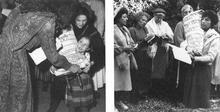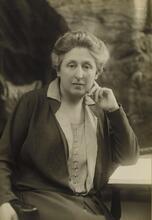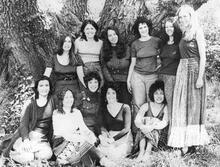Felice Cohn
Felice Cohn was one of Nevada’s first women lawyers and the fourth woman permitted to argue before the United States Supreme Court. Cohn was admitted to the Nevada Bar in 1902, at age eighteen, and was admitted to the bar of the Supreme Court in 1916. As president of the Non-Militant Suffrage Association, she wrote the 1914 amendment for suffrage adopted by the Nevada legislature. In 1922, she entered private practice, handling thousands of divorce cases in five states. She also led a number of charitable and professional organizations, including vice president of the American Bar Association in Nevada from 1930 to 1931, vice president of the National Association of Women Lawyers, and president of B’nai B’rith, among others.
Felice Cohn was one of Nevada’s first women lawyers, an author of suffragist legislation in Nevada, and one of the first women admitted to the United States Supreme Court.
Early Life and Education
She was born May 14, 1884, in Carson City, Nevada, the daughter of pioneers Morris and Pauline (Sheyer) Cohn. Morris, a merchant, established the first creamery in Nevada, introduced alfalfa raising in the state, and engaged in mining. He owned more than eight thousand acres in Carson Valley and around Lake Tahoe.
Felice taught school at age fifteen and then attended Nevada State University and Stanford University, and graduated from Washington Law School. She was admitted to the Nevada Bar in 1902 and started to practice law at age eighteen. She was admitted to the California Bar in 1908. When admitted to the bar of the Supreme Court in 1916, she was the fourth woman with that distinction.
She served as court reporter for Ormsby County for eight years and took testimony for 147 days from Frank Wildes, a witness in the State Bank and Trust Company case.
Legal Career and Legacy
Cohn served as assistant U.S. attorney at Carson City, 1911 to 1912; special sales agent for the U.S. Land Office, 1914 to 1918; and U.S. hearings attorney, 1918 to 1922. She supervised land sales and mineral claims between the United States and the Southern Pacific and Union Pacific railroads in Colorado, Kansas, Oregon, and Oklahoma, resulting in over 100,000 acres being returned to the government. She was a frequent visitor at the White House and received the personal commendation of President Woodrow Wilson.
As president of the Non-Militant Suffrage Association (1912–1914), she authored the amendment extending the franchise adopted by the Nevada legislature in 1914. She worked for child labor amendments and foster home and adoption laws. She opposed separate income tax and all other legislation adversely affecting women and children.
Cohn entered private practice in Reno in 1922, where she handled thousands of divorces. She practiced in Nevada, California, Utah, Wyoming, and Colorado. She was appointed a United States referee in bankruptcy in 1926, one of the first women in that position. Due to political infighting, she was removed in 1934 and was appointed national chair of the committee on ethics of the National Association of Referees in Bankruptcy. In 1931, she was the only practicing woman attorney in Nevada.
Cohn served on several boards, including the Reno YWCA, where she was a trustee and their lawyer. She was Nevada vice president of the American Bar Association (1930–1931), vice president of the National Association of Women Lawyers, chair of the legislative committee of the American Federation of Women’s Clubs (1929), first president and organizer of the Nevada Federation of Business and Professional Women’s Clubs, National Association of Referees in Bankruptcy, and charter member and president (1930–1931) of Nevada Native Daughters. She belonged to the International Association of Women Lawyers, Nevada Historical Society, Iota Tau Tau, Reno Branch of the United Nations, and was president of B’nai B’rith. She served on the American Red Cross board beginning in 1925, and was chair of the home service committee for over fifteen years. She was supervisor of surgical dressings during World War II and was active in the USO.
Felice Cohn died after a short illness on May 24, 1961.
American Women. The Standard Biographical Dictionary of Notable Women. Vol. 3 (1939–1940): 17.
Cohn, Felice. Clipping file. Nevada State Historical Society, Reno.
WWIAJ (1926, 1938).










